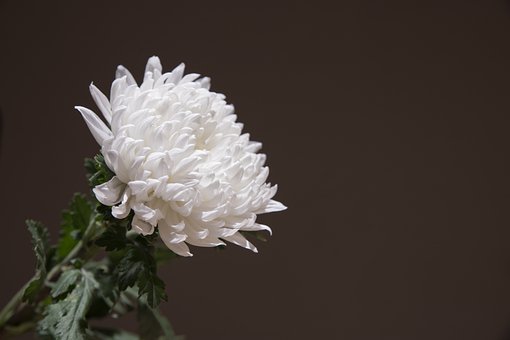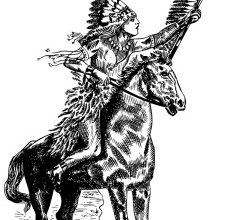
Published in the short-story collection “The Long Valley” in 1938, The Chrysanthemums is one of Steinbeck’s best-known and most-read short stories. The Chrysanthemums is a story about a young dissatisfied woman finally realizing her sexual desires in presence of a stranger. The Chrysanthemums in the story are symbolic of sexuality and yearning. The story doesn’t explicitly talk about its main point, we are left to come up with our own explanations. The plot explores the themes of dissatisfaction, sexual desire, and gender inequality.
The Chrysanthemums | Summary
During winter time Salinas valley looks like a “closed pot”, covered in fog. On Henry Allen’s ranch, the hay has been stored and the orchards are waiting for rain. Elisa Allen, Henry’s wife is working in her on her Chrysanthemums. She keeps glancing at her husband talking with some strangers. As she works on her flowers she’s full of power and energy. She’s a thirty-five-year-old beautiful woman with eyes “as clear as water”. Her house behind her is very well organized and clean.
The strangers leave and Henry comes over to talk to her. Elisa checks the stems of her flowers and is satisfied to find that there are no pests. Henry starts to praise her work and she’s pleased. She’s very proud of her Chrysanthemums, they are huge. He jokes that she should work in the orchard and grow big apples. She inquires about the men and Henry says that the men were from the Western Meat Company and brought some of their steers for a very good price. He suggests they should celebrate by going out to watch a movie and have dinner at a nice place. Henry leaves to sell the steers and Elisa goes back to working on her chrysanthemums.
A wagon appears, driven by a large bearded man. The sign on the wagon informs that the man offers services as a tinker who repairs pots and pans. The man gets out of his seat and Elisa notices that he’s wearing ragged dirty dark clothes. His hands appear very rough with dark lines on them. They make small talk and then the man asks if she has any work for him but Elisa says no. He then drives his attention to her chrysanthemums, Elisa becomes very excited. The man says he knows a woman down the road with a beautiful garden who wishes to raise chrysanthemums. He asks whether Elisa could give him some seeds and Elisa readily offers to give some shoots in a pot filled with damp sand. She runs into her house and brings a red pot.
Elisa instructs him on how to raise the flowers and tells him to pass these instructions on to the woman. She talks about “planting hands” which are essential for growing chrysanthemums; she explains the details of feeling the soil and plants with your hands as if she’s one of the flowers. She becomes very passionate while talking about her flowers; she talks in a kneeling position and almost touches the man’s trousers. She talks about starts at night which “drives into your body” “hot and sharp and lovely”. The man says he can understand what she means. He says that feeling is nice but not so nice when you’re hungry. Ashamed Elisa goes into her house and finds two pans for him to fix. The man suddenly becomes very happy to get some work to do, as he works, she talks to him about his life. She says his life seems lovely, traveling around and she wishes women could do such things. He says such a life isn’t suitable for women. She claims she’s also very skilled at fixing pans and she can live his style of life very well. However, the man claims that such a life will be dangerous for a woman. She pays him fifty cents and he leaves.
She goes into her house and scrubs her skin until it is red. She examines her naked body in the mirror and dresses up very nicely before her husband arrives. Henry arrives and exclaims that she looks very nice and strong, she asks him how. He replies “different, strong, and happy.” She asks what he means by strong. Confused, he says that she’s playing a game and then explains that she looks like she could break a calf and eat it. They drive into town, Elisa spots what appear to be the chrysanthemum sprouts that she gave to the tinker: he has thrown them out of the pot and into the road. She asks her husband if they can have wine with their dinner, and then enquires about the boxing fights and whether the men who take part hurt each other. The story ends with her crying.
The Chrysanthemums | Analysis
Elisa lives a dull life at her farmhouse cut off from the excitement of the outside world. She is a strong skilled woman but spends most of the day alone and has to work to keep the house clean. The only pleasure she receives is from growing her chrysanthemums. In a way, she’s trapped inside her uninteresting life. Elisa lives a dissatisfying life, she can’t fully express her desires and her emotional needs are unfulfilled. Henry fails to provide her with any satisfaction and pleasure. Their marriage lacks passion, it’s mostly functional. This also leads to Elisa feeling isolated. There’s nobody to satisfy her emotional and sexual needs. She is lonely, and while the men in the story go out to explore the world she is left to take care of the house. The only time she’s happy and not alone is when she’s taking care of her chrysanthemums. They provide her companionship and satisfaction. When the tinker man arrives she becomes aware of her loneliness and her suppressed desires. Elisa is unaware of her lack of fulfillment but with the arrival of the tinker man, she has an awakening.
There’s symbolism in the chrysanthemums. They represent Elisa herself, they are strong, beautiful and blossoming. Elisa also mentions that she becomes one with the flowers when she’s working on them. When the tinker man gives attention to the chrysanthemums she’s happy as if he’s giving her attention. When she gives him the chrysanthemums she also offers herself to him in a way but he rejects her. That’s further symbolized when he throws away those chrysanthemums, Elisa realizes she’s rejected and this makes her cry. People don’t value her flowers the same way they don’t value her. Even Henry just sees them as decorative objects the same way he views his wife, never giving her enough attention and value.
One thing to notice is that the tinker man was just using her love for the chrysanthemums for his own benefit. He says that he’s out of his usual road of travel but then claims to know a woman down the road. This implies he lied in order to manipulate Elisa into giving him some work. As an excellent salesman, he succeeded. He then throws away those flowers and Elisa realizes that she’s been completely rejected by him and thus cries like an “old woman”.
The Chrysanthemums | Themes
Femininity and gender inequality
This story critiques the early 20th-century stereotypical society which forces intelligent women like Elisa into a dull life. Elisa is very skilled and attractive, she’s full of energy and ambition. However, she still has no excitement in her life. The men live a far more fulfilling life than her. Henry takes care of the entire ranch and she just gets to watch him. He’s not a suitable partner for her they don’t share the same sense of humor and they’re both very different. The tinker man is more exciting than Henry but he only takes advantage of her for his work. He does not share her ideas. Both of these men are not very smart or very attractive but they get to live a better life, while Elisa’s potential is wasted. Elisa represents how most women are never allowed to express their desires and thus have to live a life trapped inside their houses.
Sexual desire and dissatisfaction
There’s also a lack of sexual fulfillment in Elisa’s life. Elisa is an energetic woman full of passion but she has no outlet to express herself. She’s thirty-five but childless it could be a hint that her marriage isn’t sexually active. Also, it could be the reason why she’s very unsatisfied in life. Sexually frustrated she becomes attracted to the tinker man. He’s the symbol of adventure that’s missing in her life. When she talks about the stars at night, her way of talking is very sensual. The way she kneels in front of the tinker man it’s a position of sexual submission. After her sexual desires are awakened it’s more upsetting for her, she’s ashamed at first, and later when the tinker man throws away her chrysanthemums she feels rejected and cries. She knows her dissatisfaction will never go away.
The Chrysanthemums | Character Sketch
Character of Elisa
Elisa Allen is a smart and passionate woman. Her life lacks adventure and satisfaction. She does not have any work to do except take care of the house, she also doesn’t have children which makes her life very uninteresting. Her husband only talks to her in a condescending humorous manner. He does not understand her and her desires. She’s very proud of her skills as a housekeeper and as a gardener; this reflects how she has nothing else to help her feel important. The conversation she has with the tinker adds some excitement to her dull life and awakens her hidden sexual desires. Her brief flashes of brilliance in the tinker’s presence show us how much she is always thinking and feeling and how rarely she gets to express herself. As a woman, she’s trapped and can’t do as she pleases. She expresses interest in the fights of men because she realizes that it’s something that’s usually attended by men, she wants to experience that freedom but decides not to go because she also knows that it’ll not provide her with any satisfaction.
The Chrysanthemums | About the author
John Steinbeck (1902 –1968) was an American author. He received the Nobel Prize for Literature in 1962. He spent much of his life in Monterey County, California, which later was the setting of some of his fiction. He uses realistic settings and imaginative writing to create many notable works. “The Grapes of Wrath” and “Of Mice and Men” are his best-known works. Many of his works have been adopted on the screen including “East of Eden”.


